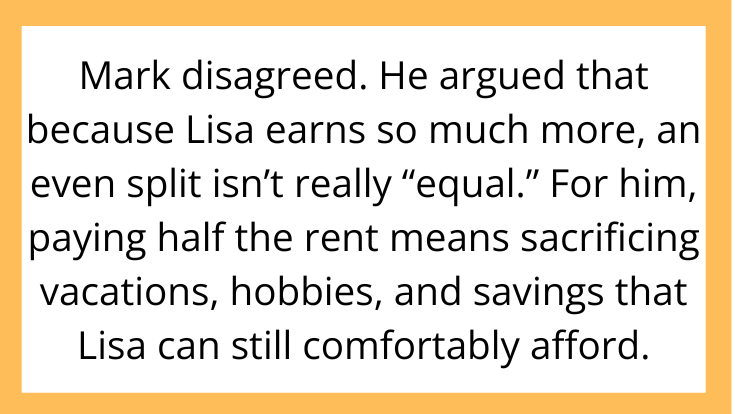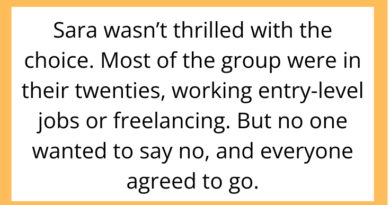AITAH for Expecting My Partner to Pay Half the Rent Even Though I Make More Money?
Living together can bring couples closer—but it can also stir up some uncomfortable conversations about money. In today’s AITAH scenario, we’re diving into a situation that left thousands of Reddit users debating: Is it fair to expect equal financial contributions when your incomes are anything but equal?
Let’s unpack this modern relationship dilemma and see who, if anyone, is actually the villain.
The Story: Equal Split or Fair Split?

A 32-year-old woman—let’s call her Lisa—shared her predicament on r/AITAH. Lisa and her boyfriend, Mark, 30, recently moved into a two-bedroom apartment together. Lisa earns nearly double Mark’s salary: she brings in about $120,000 a year, while Mark earns $65,000.
When it came time to decide how to handle rent and bills, Lisa suggested they split everything 50/50. She felt this was the simplest and most equitable approach—no one feels like they owe the other anything, and each person contributes equally to their shared life.
Mark disagreed. He argued that because Lisa earns so much more, an even split isn’t really “equal.” For him, paying half the rent means sacrificing vacations, hobbies, and savings that Lisa can still comfortably afford.
Tensions escalated when Mark proposed splitting costs proportionally to their income. Lisa refused, saying she didn’t want to feel like she was subsidizing his lifestyle. Now, she’s questioning if she’s being unreasonable.
The Case for Lisa: Independence and Simplicity

From Lisa’s perspective, splitting bills 50/50 is about maintaining independence and avoiding resentment.
She explained in her post:
“I’ve always been proud of being financially self-sufficient. I don’t want to end up in a situation where I feel like I’m paying for someone else’s life, or they feel beholden to me.”
Lisa also pointed out that Mark was fully aware of her expectations before moving in together. She feels it’s unfair for him to move the goalposts after committing to shared expenses.
The Case for Mark: Fairness Over Strict Equality

Mark sees things differently. In his view, fairness isn’t about paying the exact same amount—it’s about contributing an amount that feels proportionate and sustainable.
He shared that after paying half the rent and utilities, he has very little disposable income left, while Lisa still has thousands of dollars each month for savings, dining out, and trips.
To him, the 50/50 arrangement creates a lopsided dynamic where Lisa can enjoy a higher quality of life while he feels perpetually stressed.
What Reddit Had to Say

The AITAH community was split down the middle—literally.
Team Lisa: Stick to the Agreement
Many commenters supported Lisa’s stance.
-
Clear Expectations: Lisa was transparent about wanting to split costs equally.
-
Personal Autonomy: Just because she earns more doesn’t mean she should bankroll her partner’s lifestyle.
-
Avoiding Resentment: Proportional splits can create power imbalances and dependency.
One top-voted comment read:
“It’s your money. You shouldn’t have to compromise your principles just because you’re successful.”
Team Mark: Proportional Makes Sense
Others empathized with Mark.
-
Equity, Not Equality: A 50/50 split sounds fair on paper but ignores real financial strain.
-
Shared Lifestyle: If you live together, expenses should reflect both partners’ ability to pay.
-
Long-Term Partnership: Relationships often involve compromise and support.
As another commenter put it:
“If you want to build a life together, you need to be willing to balance things out. Otherwise, you’re roommates, not partners.”
Underlying Issues: Money and Power Dynamics

This scenario touches on deeper questions many couples face:
-
Should household expenses be split proportionally or evenly?
-
Does earning more automatically mean you have to contribute more?
-
How do you balance fairness with independence?
Ultimately, the answer depends on each couple’s values and the level of financial integration they’re comfortable with.
Potential Compromises
While the Reddit jury was divided, here are a few ideas Lisa and Mark could consider:
-
Proportional Split: Each person contributes a percentage of their income toward shared expenses.
-
Hybrid Approach: Split essential costs proportionally but keep personal spending separate.
-
Expense Cap: Agree on a maximum rent that feels manageable for both incomes.
-
Transparent Budgeting: Sit down monthly to review finances and adjust as needed.
None of these solutions are perfect, but they can help reduce resentment and keep communication open.
The Verdict: AITAH or Not?

So, is Lisa the villain here?
The answer isn’t black and white.
If you believe independence and personal boundaries are the highest priority, Lisa’s position makes sense. She’s upfront, consistent, and protective of her financial autonomy.
If you value shared partnership and economic fairness, Mark’s perspective is reasonable. Asking for proportional contributions doesn’t make him entitled—it just reflects the reality of their income gap.
Takeaway: Communication Is Everything

Money is one of the biggest sources of conflict in relationships, and this scenario is proof that transparency and compromise are essential.
Whether you lean toward 50/50 or proportional splits, the most important thing is to have honest conversations before moving in together—and to revisit those conversations when circumstances change.



